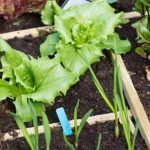Are you wondering how to keep weeds out of vegetable gardens naturally? Keeping weeds at bay is essential for maintaining the health and productivity of your garden. In this article, we will explore the importance of natural weed control methods, as well as provide practical tips and techniques for keeping your vegetable garden free from invasive plants without resorting to harmful chemicals.
Weeds can be a significant nuisance in vegetable gardens, competing with crops for water, nutrients, and sunlight. Left unchecked, they can hinder the growth of your vegetables and even lead to crop failure. Understanding the impact of weeds on plant growth is crucial for implementing effective prevention and control measures.
By identifying the common weeds that tend to plague vegetable gardens and understanding their impact on plant growth, you can develop a proactive approach to weed prevention. We’ll delve into the usual suspects that you may encounter in your garden and how they can affect the overall health of your vegetable plants.
Common Weeds in Vegetable Gardens
When it comes to maintaining a healthy vegetable garden, one of the most crucial aspects is weed control. Weeds not only compete with your vegetables for nutrients, water, and sunlight, but they can also harbor pests and diseases that can negatively impact plant growth. It’s essential to be able to identify the common weeds that tend to invade vegetable gardens and understand their impact on the overall health of your plants.
Identifying Common Weeds
Some of the most common weeds found in vegetable gardens include dandelions, chickweed, crabgrass, pigweed, purslane, and bindweed. These weeds are known for their aggressive growth and ability to quickly take over an area if left unchecked. Identifying these weeds and understanding their growth habits will help you effectively combat them.
Impact on Plant Growth
Weeds can have a significant impact on the growth of your vegetable plants. They compete for resources such as water, sunlight, and nutrients in the soil, which can lead to stunted growth or reduced yields for your vegetables.
Additionally, some weeds release chemicals into the soil that can inhibit the growth of certain crops or even attract harmful pests and diseases. Understanding how these common weeds can affect your garden will motivate you to take proactive measures to keep them at bay.
Being able to recognize these common weeds and understanding their impact on your vegetable garden is the first step in implementing natural weed control methods. By knowing what you’re up against, you’ll be better equipped to choose the most suitable strategies for keeping these pesky invaders out of your garden beds.
By following some simple guidelines for natural weed prevention and control, you can ensure that your vegetable garden remains healthy and productive throughout the growing season without relying on harmful chemicals or synthetic herbicides.
Mulching
One of the key benefits of using organic mulch is that it breaks down over time, adding valuable nutrients to the soil as it decomposes. This process enhances the fertility of the soil, providing essential elements for plant growth and reducing the need for chemical fertilizers. As a result, plants in mulched vegetable gardens tend to be healthier and more productive.
Moreover, certain types of organic mulch can also deter pests and attract beneficial insects, further contributing to a balanced and thriving garden ecosystem. This natural approach not only keeps weeds at bay but also supports biodiversity and sustainability in vegetable gardens.
| Organic Material | Brief Description |
|---|---|
| Straw | Lightweight and easy to spread; helps retain moisture well |
| Wood Chips | Durable and long-lasting; adds organic matter to the soil as it breaks down |
| Grass Clippings | Rich in nitrogen; should be used in thin layers to prevent matting |
Companion Planting
One popular example of companion planting for weed control is the combination of marigolds and vegetables. Marigolds release a substance from their roots that deters nematodes, small organisms that can damage vegetable plants. Additionally, their strong scent helps repel many common garden pests. By interplanting marigolds with your vegetables, you can create a natural barrier against unwanted intruders in your garden.
Another beneficial companion plant for weed control is the humble onion. Onions have pungent odors and strong flavors that make them unappealing to many pests and even some weeds. Planting onions alongside your vegetables can help keep weeds from taking over your garden beds.
Furthermore, planting cover crops like clover or buckwheat can also help smother weeds by providing dense ground cover. These cover crops not only compete with weeds for space and nutrients but also improve soil health by adding organic matter when they are eventually turned into the soil.
| Companion Plant | Beneficial Properties |
|---|---|
| Marigolds | Deters nematodes and repels garden pests |
| Onions | Pungent odor deters pests and some weeds |
| Cover Crops (clover or buckwheat) | Compete with weeds for space and nutrients while improving soil health |
Soil Health and Weed Prevention
Soil health plays a crucial role in the overall well-being of a vegetable garden, including its ability to resist weed infestation. By understanding how to optimize soil conditions, gardeners can effectively discourage weed growth without the need for harmful chemicals or invasive techniques.
Understanding Soil Composition
One of the key aspects of soil health is understanding its composition. Healthy soil is composed of a balanced mixture of sand, silt, and clay, along with organic matter. This combination provides an ideal environment for plant growth while also making it more challenging for weeds to take root and thrive. Conducting a soil test can help determine the current composition and identify any necessary adjustments.
Building Soil Fertility
Fertile soil is essential for healthy plant growth and can also help prevent weed infestations. By enriching the soil with organic matter such as compost or aged manure, gardeners can improve soil fertility and create an environment that is more conducive to their desired plants rather than weeds. Additionally, utilizing natural fertilizers that are high in beneficial nutrients, like nitrogen and potassium, can further enhance the overall health of the soil and deter weed growth.
Maintaining Proper Moisture Levels
Consistent moisture levels in the soil not only benefit plants but also play a role in discouraging weed growth. By implementing proper irrigation techniques and mulching around vegetable plants, gardeners can maintain adequate moisture levels in the soil while simultaneously creating an environment that inhibits weed germination and establishment.
By understanding how to optimize soil conditions through proper composition, fertility, and moisture levels, gardeners can effectively reduce weed growth in their vegetable gardens naturally. This approach not only benefits the immediate garden but also contributes to long-term sustainability and environmental stewardship within the gardening community.
Hand Weeding Techniques
Hand weeding is one of the most traditional and natural ways to keep weeds out of vegetable gardens. This method involves physically removing the unwanted plants from the garden beds, without the use of any chemical herbicides. Here are some effective hand weeding techniques to consider:
1. Use a Hand Trowel: A hand trowel is a small handheld tool with a narrow, pointed metal blade that is perfect for digging out weeds, especially those with deep roots. Simply insert the trowel next to the weed’s base and carefully lift it out, making sure to remove as much of the root system as possible.
2. Pull Weeds After Rain or Watering: Weeds are easier to remove when the soil is moist. Wait until after a rain shower or watering session to pull out the weeds from your vegetable garden. This will make it easier to extract their roots and reduce disturbance to your crops.
3. Remove Weeds Early: It’s important to tackle weeds in their early stages before they have a chance to spread and compete with your vegetables for nutrients and sunlight. Regularly inspect your garden for any signs of weed growth and remove them as soon as possible.
By incorporating these hand weeding techniques into your regular gardening routine, you can effectively keep weeds at bay without resorting to harmful chemicals that may impact your vegetables and soil health negatively.
Homemade Weed Control Solutions
Another effective homemade weed control solution is a saltwater spray. Mix salt with water and apply it directly to the base of unwanted weeds. The salt will dehydrate the plants and ultimately kill them off, preventing further growth in your vegetable garden. It’s important to note that while this method is highly effective, it should be used sparingly and with caution as excessive use of salt can harm your soil and other plants in the area.
Furthermore, utilizing homemade mulch made from organic materials like straw, grass clippings, or leaves can act as a natural barrier to prevent weed growth in your vegetable garden. Not only does mulching help suppress weeds by blocking sunlight from reaching weed seeds, but it also improves soil health by retaining moisture and adding nutrients as it decomposes.
Ultimately, incorporating homemade mulch into your garden maintenance routine is a simple yet effective way to keep weeds out of your vegetable garden naturally.
Overall, there are plenty of natural homemade weed control solutions that can effectively keep your vegetable garden free from unwanted weeds without resorting to harmful chemicals. These methods not only promote a healthy ecosystem within your garden but also provide peace of mind knowing that you’re cultivating nutritious vegetables in an environmentally-friendly manner.
Regular Maintenance
Once you have implemented natural methods to keep weeds out of your vegetable garden, it is important to establish a regular maintenance routine to ensure that your efforts continue to be effective. By consistently monitoring and tending to your garden, you can prevent weed growth and maintain the overall health of your plants. Here are some tips for establishing a maintenance routine:
1. Regular Inspections: Take the time to regularly inspect your vegetable garden for any signs of weed growth. This can be done on a weekly basis or as needed, depending on the size of your garden and the time you have available.
2. Weed Removal: When you spot weeds in your garden, it is important to promptly remove them before they have the chance to spread and compete with your vegetables for nutrients. Use hand weeding techniques or homemade weed control solutions to safely and effectively eliminate weeds without using harmful chemicals.
3. Mulch Renewal: Check on the status of your mulch regularly and add more organic materials as needed. Mulching not only helps prevent weed growth but also improves soil health by retaining moisture and providing insulation for plant roots.
By staying proactive with regular maintenance, you can effectively keep weeds out of your vegetable garden naturally while promoting the healthy growth of your crops.
Overall, establishing a maintenance routine plays a crucial role in keeping weeds out of vegetable gardens naturally. By conducting regular inspections, removing weeds promptly, renewing mulch, utilizing companion planting, optimizing soil health, and implementing natural weed control solutions, you can successfully maintain a thriving vegetable garden without relying on harmful chemicals or synthetic herbicides. With dedication and consistent effort, you can enjoy bountiful harvests while preserving the natural balance of your garden ecosystem.
Conclusion
In conclusion, maintaining a weed-free vegetable garden naturally is not only beneficial for the overall health of your plants, but it also contributes to a more sustainable and environmentally friendly gardening practice. By understanding the impact of weeds on plant growth and implementing natural weed control methods, you can effectively manage weed growth without relying on harmful chemicals.
Whether it’s through mulching, companion planting, improving soil health, hand weeding techniques, homemade weed control solutions or regular maintenance, there are numerous strategies to keep weeds out of your vegetable garden naturally.
One of the key benefits of natural weed control is the preservation of soil health. By using organic materials for mulching and implementing companion planting techniques, you not only prevent weed growth but also improve the overall quality of the soil. This leads to better nutrient absorption for your vegetables and healthier plant growth in the long run.
Furthermore, by avoiding the use of synthetic herbicides and pesticides, you contribute to a safer and more sustainable environment for yourself and future generations. Natural weed control methods help reduce chemical runoff into water sources while promoting a healthier ecosystem in your garden. Overall, understanding how to keep weeds out of vegetable gardens naturally not only benefits your plants but also contributes to a more environmentally conscious approach to gardening.
Frequently Asked Questions
How Do I Keep Weeds From Growing in My Vegetable Garden?
To keep weeds from growing in your vegetable garden, it’s important to regularly remove any existing weeds and their roots. Mulching can also help by suppressing weed growth, while planting vegetables close together can create a canopy that blocks out sunlight and prevents weed growth.
How Do You Kill Weeds but Not Vegetables?
Killing weeds without harming vegetables can be done using natural remedies like boiling water or vinegar, which can be applied directly to the unwanted plants. Pulling weeds by hand is another effective method, as long as you’re careful not to disturb the roots of your vegetables.
How Do Farmers Keep Weeds Out of Garden?
Farmers use various methods to keep weeds out of their gardens. This includes mechanical cultivation – physically removing the weeds with tools – and applying herbicides or organic mulches to suppress weed growth. Crop rotation and cover cropping are also strategies employed to reduce weed pressure in agricultural settings.

If you’re looking to get into vegetable gardening, or are just looking for some tips on how to make your current garden better, then you’ve come to the right place! My name is Ethel and I have been gardening for years. In this blog, I’m going to share with you some of my best tips on how to create a successful vegetable garden.





